(word完整版)初中英语人教版八年级下册现在完成时
- 格式:doc
- 大小:15.10 KB
- 文档页数:8
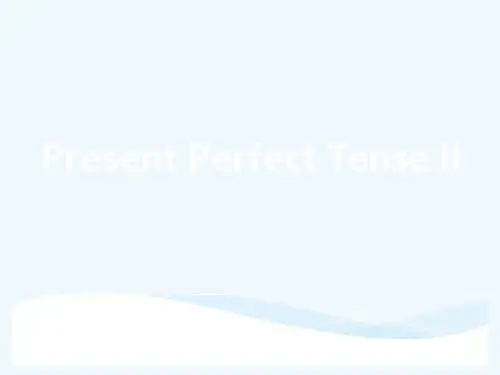
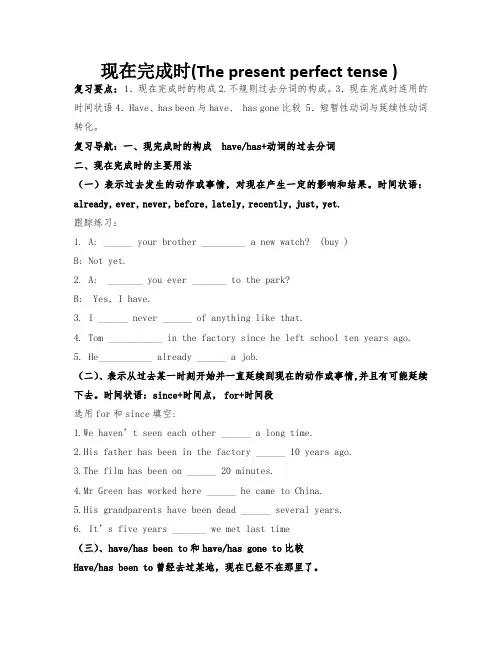
现在完成时(The present perfect tense )复习要点:1.现在完成时的构成2.不规则过去分词的构成。
3.现在完成时连用的时间状语4.Have、has been与have、 has gone比较5.短暂性动词与延续性动词转化。
复习导航:一、现完成时的构成 have/has+动词的过去分词二、现在完成时的主要用法(一)表示过去发生的动作或事情,对现在产生一定的影响和结果。
时间状语:already,ever,never,before,lately,recently,just,yet.跟踪练习:1.A: ______ your brother _________ a new watch? (buy )B: Not yet.2. A: _______ you ever _______ to the park?B: Yes, I have.3. I ______ never ______ of anything like that.4. Tom ___________ in the factory since he left school ten years ago.5. He___________ already ______ a job.(二)、表示从过去某一时刻开始并一直延续到现在的动作或事情,并且有可能延续下去。
时间状语:since+时间点,for+时间段选用for和since填空:1.We haven’t seen each other ______ a long time.2.His father has been in the factory ______ 10 years ago.3.The film has been on ______ 20 minutes.4.Mr Green has worked here ______ he came to China.5.His grandparents have been dead ______ several years.6. It’s five years _______ we met last time(三)、have/has been to和have/has gone to比较Have/has been to曾经去过某地,现在已经不在那里了。
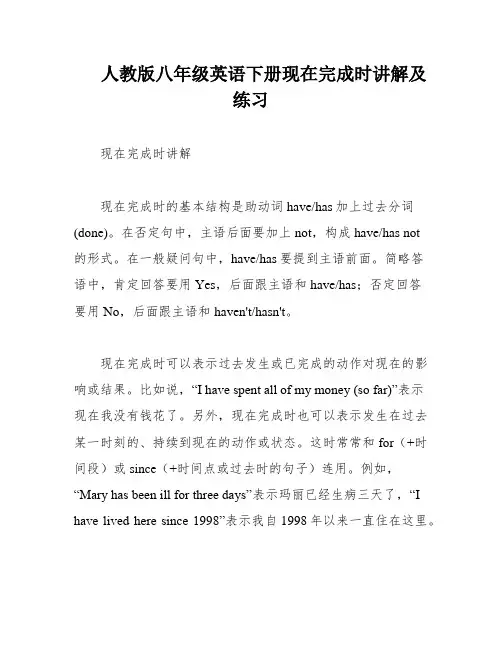
人教版八年级英语下册现在完成时讲解及练习现在完成时讲解现在完成时的基本结构是助动词have/has加上过去分词(done)。
在否定句中,主语后面要加上not,构成have/has not的形式。
在一般疑问句中,have/has要提到主语前面。
简略答语中,肯定回答要用Yes,后面跟主语和have/has;否定回答要用No,后面跟主语和haven't/hasn't。
现在完成时可以表示过去发生或已完成的动作对现在的影响或结果。
比如说,“I have spent all of my money (so far)”表示现在我没有钱花了。
另外,现在完成时也可以表示发生在过去某一时刻的、持续到现在的动作或状态。
这时常常和for(+时间段)或since(+时间点或过去时的句子)连用。
例如,“Mary has been ill for three days”表示玛丽已经生病三天了,“I have lived here since 1998”表示我自1998年以来一直住在这里。
现在完成时还有一些标志词,可以表达过去完成的动作对现在的影响。
这些标志词包括already、just和yet。
例如,“He has al ready got her help”表示他已经得到她的帮助,“He hasn't come back yet”表示他还没有回来。
This is the best film I have ever seen。
I have never seen a better movie before.He has never been to Beijing before。
He has never had the chance to visit Beijing.He says he has been to the USA three times already。
He has had the opportunity to visit the USA on three separate ns.So far。
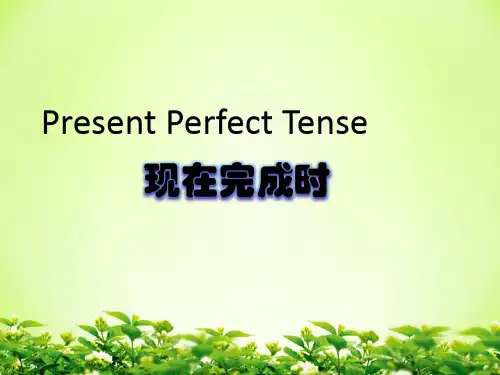
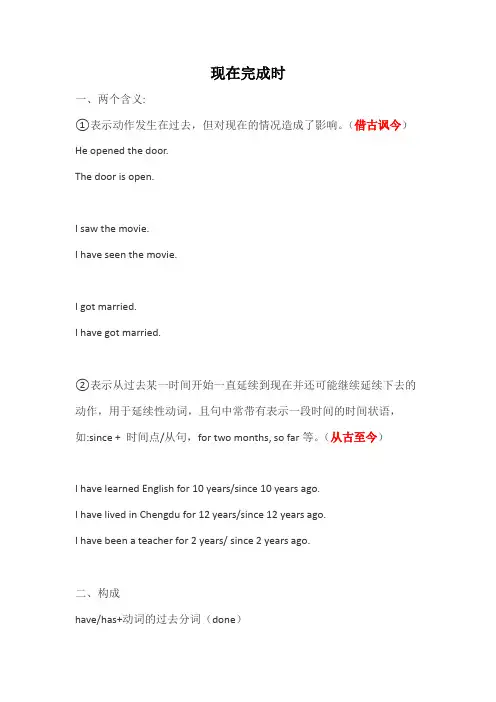
现在完成时一、两个含义:①表示动作发生在过去,但对现在的情况造成了影响。
(借古讽今)He opened the door.The door is open.I saw the movie.I have seen the movie.I got married.I have got married.②表示从过去某一时间开始一直延续到现在并还可能继续延续下去的动作,用于延续性动词,且句中常带有表示一段时间的时间状语,如:since + 时间点/从句,for two months, so far等。
(从古至今)I have learned English for 10 years/since 10 years ago.I have lived in Chengdu for 12 years/since 12 years ago.I have been a teacher for 2 years/ since 2 years ago.二、构成have/has+动词的过去分词(done)三、标志词for, since, already, yet, before, recently, over the …., in the past few…..四、already与yet的区别already用于肯定句(已经)yet用于否定句(还)和疑问句(已经)ever & neverever作副词,意为“曾经”,常用于现在完成时的一般疑问句和肯定句中,置于主语之后,过去分词之前。
never作副词,意为“从不;从未”,用于现在完成时中,表示否定,位于助动词have/has之后,过去分词之前。
五.have been to & have gone to & have been inhave been to 去了某地,已回have gone to 去了某地,未回have been in 在哪里待了多久后面是地点副词there、here、home 时,省略to六、延续性和非延续性1. 含义:延续性动词表示能够延续的动作,这种动作可以延续下去或产生持久影响。
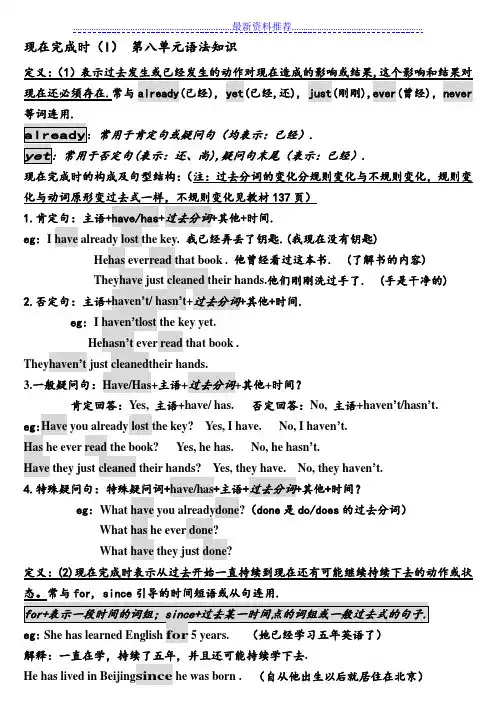
现在完成时(I)第八单元语法知识等词连用.常用于肯定句或疑问句(均表示:已经).(表示:还、尚),疑问句末尾(表示:已经).现在完成时的构成及句型结构:(注:过去分词的变化分规则变化与不规则变化,规则变化与动词原形变过去式一样,不规则变化见教材137页)1.肯定句:主语+have/has+过去分词+其他+时间.eg: I have already lost the key.我已经弄丢了钥匙.(我现在没有钥匙)Hehas everread that book .他曾经看过这本书. (了解书的内容)Theyhave just cleaned their hands.他们刚刚洗过手了. (手是干净的) 2.否定句:主语+haven’t/ hasn’t+过去分词+其他+时间.eg: I haven’tlost the key yet.Hehasn’t ever read that book .Theyhaven’t just cleanedtheir hands.3.一般疑问句:Have/Has+主语+过去分词+其他+时间?肯定回答:Yes, 主语+have/ has. 否定回答:No, 主语+haven’t/hasn’t.eg:Have you already lost the key? Yes, I have. No, I haven’t.Has he ever read the book? Yes, he has. No, he hasn’t.Have they just cleaned their hands? Yes, they have. No, they haven’t.4.特殊疑问句:特殊疑问词+have/has+主语+过去分词+其他+时间?eg: What have you alreadydone?(done是do/does的过去分词)What has he ever done?What have they just done?定义:(2)现在完成时表示从过去开始一直持续到现在还有可能继续持续下去的动作或状解释:一直在学,持续了五年,并且还可能持续学下去.He has lived in Beijing since he was born . (自从他出生以后就居住在北京)解释:从出生后就一直住在北京,持续到现在,还有可能一直住下去)Have you stayed here since3 o’clock?(自从3点后你就一直呆在这儿吗?)例题:选用for和since填空:1.We haven’t seen each other ___ a long time.2.His father has been in the factory ____ 10 years ago.3.The film has been on ____ 20 minutes.4.Mr. Green has worked here _____ he came to China.5.His grandparents have been dead _____ several years.6. It’s five years ______ we met last time.7.I have already had dinner. (否定)I _______ _______ dinner _______.8. Mum has cooked the dinner.Mum _______ ________ the dinner.9. Susan has learned English at school. Susan________________English at school.10.I have already had dinner. (提问)_______ _______ ________ _________ _______?11. He has just finished his homework. _______ _______ _______ ________ ________?12. Susan has learned English at school. _______ _______ ________ ________ _______?过去的时间状语连用.eg: I have already seen the film. (现在完成时,已经看了这部电影,并且知道电影的内容)I saw the film last week. (一般过去式,因为后面有表示过去的时间状语last week)He has lived here since 1993. (现在完成时,后面有since引导的时间状语从句)He lived here in 1993. (一般过去时,1993年住在这儿,现在没住在这儿了)例题:1. _____ you ________(clean) the room?Yes, we__________(do) that already.2. When _______ you ______(do) it?We _______(do) it an hour ago.3.______ he ______(see) this film yet? Yes.4. When _____ he _____(see) it?He______ it last week.5. I _______ (read) the novel twice. It’s interesting.6.Mr. Chen _________(give)up smoking last year.7. She _____(go) to Pairs, hasn’t she? Yes.How ____ she ____(go) there?She ____(go) there by air.现在完成时(II)第九单元语法知识1.构成:含有be动词的现在完成时的谓语部分由“have/has+ been+ to+地点”构成,表示:曾经去过某地… (been是be的过去分词,不规则变化)2.基本句型:(1)肯定句:主语+have/has+ been+ to+地点.肯定回答:Yes, 主语+ have/has. 否定回答:主语+haven’t/ hasn’t.eg: Have you been to Australia? Yes, I have. No. I haven’t.Have they been toBeijing? Yes, they have. No, they haven’t.Has he been toSouth Africa? Yes, he has. No, he hasn’t.(4)特殊疑问句:特殊疑问词+have/has+ 主语+ been?eg:Where have you been?Where have they been?Where has he been?3.用法:用来表示之前已经发生和完成度的动作与状态,其结果却和现在有联系.动作和结果发生在过去,但它的影响现在还在.可以和never, ever,once, twice, three/four…times 等副词连用.eg: They have been to Chongqing twice.I have never been to Sichuan.Has she ever been to Hainan?3.区别:eg:例题:1.—Where is your brother?—He __________ the shop. He’ll be back soon.2. — _____ you ever _______ to America?—Yes, I _______ New York twice.3. —David ___________ Australia.—I’m sure he has already arrived.4. —Is Benny here?—No, he ______ the school library. He left five minutes ago.4.Mike and his parents __________ the south for half a year.6. Mum is not at home now. she _________ the shop.7. You can’t find him. He__________Xi’an.8. Mr. Zhang __________ this school for ten years. He knows everyone here.9. Miss. Brown __________ China three times.10. I __________ the West lake, Look, I have taken many photos of it .11. Tom ___________ Jim’s home, but he hasn’t come back.12. We ____________ the bookshop and bought many books.13. My parents _________ Shandong for ten years.现在完成时(III)第十单元语法知识动词按其动作发生的方式,发生过程的长短可分为延续性动词与非延续性动词。
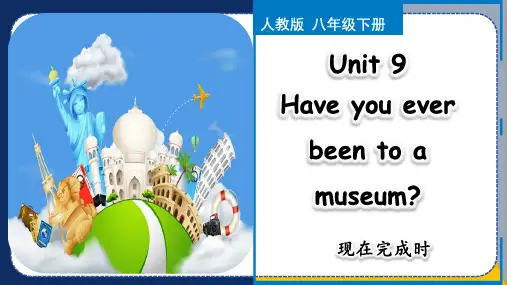
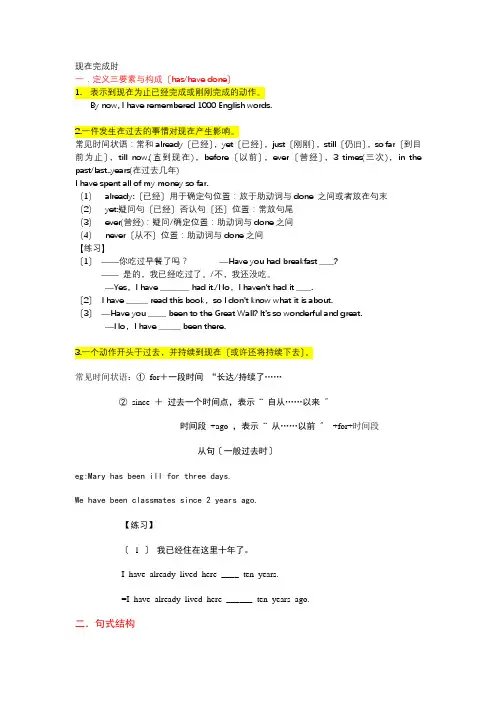
现在完成时一.定义三要素与构成〔has/have done〕1.表示到现在为止已经完成或刚刚完成的动作。
By now, I have remembered 1000 English words.2.一件发生在过去的事情对现在产生影响。
常见时间状语:常和already〔已经〕,yet〔已经〕,just〔刚刚〕,still〔仍旧〕,so far〔到目前为止〕,till now,(直到现在),before〔以前〕,ever〔曾经〕,3 times(三次),in the past/last..years(在过去几年)I have spent all of my money so far.(1)already:〔已经〕用于确定句位置:放于助动词与done 之间或者放在句末(2)yet:疑问句〔已经〕否认句〔还〕位置:常放句尾(3)ever(曾经):疑问/确定位置:助动词与done之间(4)never〔从不〕位置:助动词与done之间【练习】〔1〕——你吃过早餐了吗?—Have you had breakfast ____?——是的,我已经吃过了。
/不,我还没吃。
—Yes,I have ________ had it./No,I haven’t had it ____.〔2〕I have ______ read this book,so I don’t know what it is about.〔3〕—Have you _____ been to the Great Wall? It’s so wonderful and great.—No,I have ______ been there.3.一个动作开头于过去,并持续到现在〔或许还将持续下去〕。
常见时间状语:①for+一段时间“长达/持续了……②since+过去一个时间点,表示“自从……以来〞时间段+ago,表示“从……以前〞+for+时间段从句〔一般过去时〕eg:Mary has been ill for three days.We have been classmates since 2 years ago.【练习】〔1〕我已经住在这里十年了。
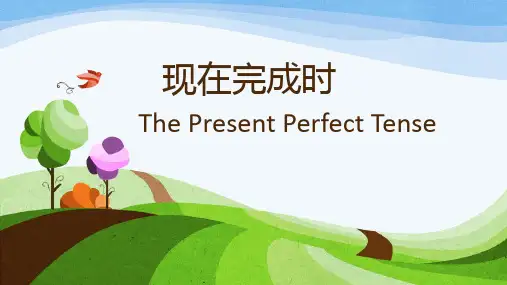
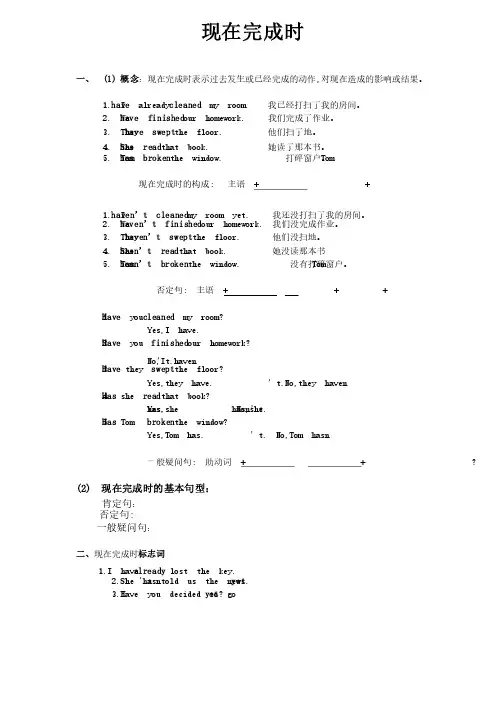
现在完成时一、 (1) 概念:现在完成时表示过去发生或已经完成的动作:现在完成时表示过去发生或已经完成的动作,,对现在造成的影响或结果。
对现在造成的影响或结果。
1. I have already c leaned cleaned my room. 我已经打扫了我的房间。
我已经打扫了我的房间。
2. We have finished our homework. 我们完成了作业。
我们完成了作业。
3. They have swept the floor. 他们扫了地。
他们扫了地。
4. She has read t hat book. that book. 她读了那本书。
她读了那本书。
5. Tom has broken the window. Tom 打碎窗户。
打碎窗户。
现在完成时的构成现在完成时的构成: : 主语主语 + + + +1. I haven haven’’t cleaned my room yet. 我还没打扫了我的房间。
我还没打扫了我的房间。
2. We haven haven’’t finished our homework. 我们没完成作业。
我们没完成作业。
3. They haven haven’’t swept t he floor. the floor. 他们没扫地。
他们没扫地。
4. She hasn hasn’’t read t hat book. that book. 她没读那本书她没读那本书5. Tom hasn hasn’’t broken t he window. Tom the window. Tom 没有打碎窗户。
没有打碎窗户。
否定句否定句: : 主语主语主语 + + + + + +1. Have you c leaned cleaned my room?Yes,I have.2. Have y ou you finishedour homework? No,I haven ’t. 3. Have they swept t he floor?the floor? Yes,they have. No,they haven ’t.4. Has she read t hat book?that book? Yes,she has. No,she hasn hasn’’t.5. Has Tom broken t he window?the window? Yes,Tom has. No,Tom hasn ’t.一般疑问句一般疑问句: : 助动词助动词助动词 + + ? + + ?(2) 现在完成时的基本句型:肯定句:肯定句:否定句否定句: : 一般疑问句:一般疑问句:二、现在完成时标志词1.I have already lost the key.2.She hasn ’t told us the news yet .3.Have you decided to go yet ?4.I have just cleaned my hands.5.John has never been to Nanjing6.Have you ever been to a museum?7.He has stayed here since 5 5 o o ’clock.David has lived here since 1992.8.He has has stayed stayed stayed here here since 5 5 hours hours hours ago. ago.His father has been in the Party since 10 years ago.9.She has taught English since he he came came came here. here.She has taught us since I came to this school.10.He has kept the book for 2 weeks.I have had this dictionary for t hree years.three years. Since: (自…以来)(1)(2)(3)for(长达)just (谓语动词之前谓语动词之前谓语动词之前) before() before(句末)句末) so far so far 到目前为止到目前为止in the past/last few years(过去几年来过去几年来) )练一练:练一练:选用选用 for for 和 since 填空填空: :1.We haven ’t seen each other ______ a long time.2.His father has been in the Party ______ 10 years ago.3.The film has been on ______ 20 minutes.4.Mr Green has worked here ______ he came to China.5.His grandparents have been dead ______ several years.6. It ’s five years _______ we met last time.1.The house is dirty. We _______it for weeks.A didn ’t cleanB hadn ’t cleanedC don ’t cleanD haven ’t cleaned2. ---Have you found your keys _______---Yes, I have _______ found them.A already; yetB yet;alreadyC already;alreadyD yet;yet3.3. -- I ’m sorry to keep you waiting.--Oh, not at all. I _____here only a few minutes.A have beenB had beenC wasD will be4.4. You don ’t need to describe her. I _______ her several times. A. had met B have met C met D meet5. --Will you go to Beijing for vacation ?--I _______ to go , but I don ’t know if I can go .A was planningB have plannedC had been planningD have been planning planning6. --When will they leave ?--They ______very soon .A do leaveB are leavingC have leftD leave7 --Was he studying for an exam ?--Yes , he's ____ it last week.A doingB to takeC makingD to give8.The teacher told the pupils that the earth ____ round.A isB wouldC wasD were9.9. She _______ such an interesting book before.A was never readingB will never readC had never readD has never rea10.10. How long do you think the meeting ______A is lastingB is lastedC will lastD lasts11. 11. I ____________(wait) for him for two hours . I am very angry . I ____________(wait) for him for two hours . I am very angry .12. 12. He _________ (be) a doctor since he was twenty .13. 13. The film __________ (be) on for fifteen minutes .14. 14. ____ you ever ____ (read) that book before ?15. 15. ____ you ever ____ (try) to change her ?16. 16. No one ____________ (arrive) here yet . No one ____________ (arrive) here yet .17. 17. ______ the bus _____ (leave) yet ?18. 18. I____ I____ I____ already already already ______ ______ ______ (see) (see) (see) the the the film. film. film.19. 19. My My My father father father ____ ____ ____ just just just _____ _____ _____ (come) (come) (come) back back back from from from work. work.20. 20. I I I _____________ _____________ _____________ (work) (work) (work) here here here since since since I I I ______ ______ ______ (move) (move) (move) here here here in in in 1999. 1999. 21. 21. So So So far far far I I I _______________(make) _______________(make) _______________(make) quite quite quite a a a few few few friends friends friends here. here.22. 22. -How -How -How long long long _______ _______ _______ the the the Wangs Wangs Wangs _______(stay) _______(stay) _______(stay) here? -For here? -For two two weeks. weeks. weeks.23. 23. I I I ________ ________ ________ just just just ___________ ___________ ___________ (finish) (finish) (finish) my my my homework. homework. homework.24.______ 24.______ you you you ______ ______ ______ (find) (find) (find) your your your science science science book book book yet? yet?一般过去时与现在完成时之比较1)一般过去时表示过去某时发生的动作或单纯叙述过去的事情,强调动作,和现在不发生关系。
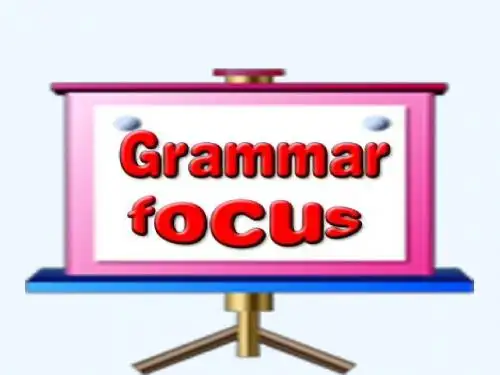
八下 Unit 8 现在完成时(一)一、用 never,ever, already , yet填空。
1. I have seen him before, so I have no idea about him.2. Jack has finished his homework.3. Have you seen this film? No, I have seen it.4.Has the bus left ? Yes,it has left.5. Sally hasn't finished reading her new book .二、用括号中所给单词的适当形式填空。
1. The young man (live)alone since he worked in Beijing.2. Miss Lee ( teach)us English since she came here three years ago.3.Lily (listen)carefully but heard nothing important.4.Shall I tell Tom the good news?No, you needn't. I (tell) him already.5. Turn off the radio,dear. The baby is sleeping.There is no need. He (wake) up.三、单项选择。
1. Today, all the erhu masters play and praise“Erquan Yingyue”.It one of China's national treasures already.A. beesB. becameC. has beeD. being2. He promised to pick me up at the school gate. However, he yet.A. didn't arriveB. doesn't arriveC. isn't arrivingD. hasn't arrived3.China develops so fast.That's true. It a lot already.A.changesB. changedC.will changeD. has changed4. My aunt is a writer. She more than ten books since 1980.A.writesB. wroteC. has writtenD.will write5. you the movie Wolf Warrior II?Not yet. I'll see it this Sunday.A. Did; seeB.Do; seeC.Have; seenD.Will; see四、句型转换。
现在完成时讲解一.基本结构:助动词have/has+过去分词(done)二.句型:否定句:主语+have/has+not+过去分词+其他.一般疑问句:Have/Has+主语+过去分词+其他.简略答语:Yes,主语+have/has.(肯定)No,主语+haven't/hasn't.(否定)三.用法(1)现在完成时表示过去发生或已经完成的动作对现在造成的影响或结果I have spent all of my money(so far).(含义是:现在我没有钱花了.)Guo zijun has(just/already)come.(含义:郭子君现在在这儿)My father has gone to work.(含义是:我爸爸现在不在这儿)(2)现在完成时可以用来表示发生在过去某一时刻的,持续到现在的动作(用行为动词表示)或状态(be动词表示)常与for(+时间段),since(+时间点或过去时的句子)连用.①f or+时段②s ince+过去一个时间点(译为:自从……以来)③s ince+时段+ago④s ince+从句(过去时)●⑤I t is+时段+since+从句(过去时)Mary has been ill for three days.I have lived here since1998.四.has gone(to),has been(to),has been(in)的区别Have/Has gone(to):去了(现在不在说话现场)Where is your father?H e has gone to Shanghai.Have/Has been(to):去过(已不在去过的地方)My father has been to Shanghai.Have/has been in:呆了多久(还在所呆的地方)My father has been in Shanghai for two months./sin ce two months ago.五.现在完成时的标志1.现在完成时的含义之一是过去完成的动作对现在仍有影响,用以下四大标志词可以表达这种含义:*以already,just和yet为标志He has already got her help.他已得到她的帮助。
语法全解:现在完成时一、现在完成时的构成(一)肯定式主语+助动词have/has+过去分词+其它.说明:这里的have/has是助动词,没有什么具体意义。
当主语是第三人称单数时助动词用has,其余人称一律用have。
has, have的缩略式分别为’s或’ve。
规则动词过去分词的构成与过去式的构成方式一样,不规则动词可参看不规则动词表。
实例:1) I’ve just copied all the new words.我刚抄写了所有的生词。
(表示不要再抄了)2) She has lost her books.她丢失了她的书。
(表示到目前为止还没有找到)(如果用过去时:She lost her books.则强调书是过去丢的这一动作,而不知现在有没有找到。
)3) We’ve just cleaned the classroom. 我们刚好打扫了教室。
(表明现在教室是干净的)(二)否定式主语+助动词have/has+not+过去分词+其它.说明:现在完成时构成否定句时,只需在助动词have/has后面加not就行。
have not, has not的缩略式分别为haven’t, hasn’t。
另外,肯定句中有some, already时,改为否定时要分别改成any, yet。
例:1)I haven’t finished my homework yet.我还没有完成我的作业。
2)She hasn’t travelled on a train. 她没有坐火车旅行过。
3)We have never spoken to a foreigner.我们从来没有和外国人说过话。
注:有时not可以用never代替,表示“从来没有”的意思。
又如:4) I have never seen him before.以前我从来没有见过他。
(三)一般疑问式助动词Have/Has +主语+过去分词+其它?说明:把陈述句中的have或has放到句首,句末打问号,同时把句中的some, already改为any, yet就构成了一般疑问句。
八下Unit 9 现在完成时(二)一、用括号中所给单词的适当形式填空。
1. ( not be) to the water park. Let's go tomorrow.2. she (be) to the space museum?Yes, she has.3. My brothe r(go) to the amusement park. He ( be) there twice since last month.4. you eve r(be) to the Terracotta Army in Xi'an?Yes, I went there last year.5. As an exchange student,Alan (be) in Qiqihar for one and a half years.二、单项选择。
1. Julie's father to London last month. He there three times.A. went; had goneB. has gone; has beenC. went; has beenD. has been; had gone2 you ever to the history museum?A.Did; goB.Will; goC. Have; goneD.Have; been3.(达州中考改编)Where's your brother? He the library and .A. has been to; so Lucy isB. has gone to; so Lucy hasC. has gone to; so has LucyD. has been in; so is Lucy4. The Whites have Hong Kong, China.Oh, really? I have never there before.A. been to; goneB. gone to; beenC. been to; gone toD. gone to; been to5. Where is your uncle?He America and he New York for two weeks.A. has been to; has been inB. has gone to; will stay inC. has been in; has been toD. has stayed in; has gone to三、句型转换。
Unit 8 Present perfect tenseI. Teaching aimsTo make the students understand what is present perfect tense.Be able to find out the structure of present perfect tense according to some sentences.have been to, have gone to, have been inII. Language contentsThe structure of present perfect tense:S + have/has not + done.Have/has + S + done?S + have/has + done.The use of present perfect tense:We use the present perfect tense to talk about things that started in the past and continued to the present.We also use the present perfect tense to talk about things that happened in the past and have connection with the present.III .Procedures1.Warm upWhat did you do last week? What are you doing now?2.PresentationStep 1Give some sentences to the students, ask them to discuss and findout the similarities and differences of these sentences.Step 2Watching a funny flash and ask the students questions.Step 3Show students the use of the present prefect tense, do some gestures to help them understand the uses better3.PracticeStep 1Ask students to translate some sentences into English.Step 2Homework: Write an article about holidays, using present perfect tense.Exercises:Translate the following sentences 1. I have lived in Beijing.2. He has already seen the film.3. I have not had his lunch yet.4. She has not visited your school before.5. Have you ever been to the Forbidden City before ?6. I have never been to that farm before.7. I have just lost my English book.。
现在完成时教学方案一、现在完成时的构成(一)肯定式主语+助动词have /has +过去分词+其它说明:这里的have /has是助动词,没有什么具体意义。
当主语是第三人称单数时助动词用has,其余人称一律用have。
has,have的缩略式分别为s 或ve。
规则动词过去分词的构成与过去式的构成方式一样,不规则动词可参看不规则动词表。
实例:1)Ive just copied all the new words .我刚抄写了所有的生词。
(表示不要再抄了)2)She has lost her books .她丢失了她的书。
(表示到目前为止还没有找到)(如果用过去时:She lost her books . 则强调书是过去丢的这一动作,而不知现在有没有找到)3)Weve just cleaned the classroom .我们刚好打扫了教室。
(表明现在教室是干净的)(二)否定式主语+助动词have /has+not+过去分词+其它说明:现在完成时构成否定句时,只需在助动词have /has后面加not就行。
have not,has not的缩略式分别为havent ,hasnt。
另外,肯定句中有some,already时,改为否定时要分别改成any,yet。
实例:1)I havent finished my homework yet.我还没有完成我的作业。
2)She hasnt travelled on a train .她没有坐火车旅行过。
3)We have never spoken to a foreigner.我们从来没有和外国人说过话。
注:有时not可以用never代替,表示从来没有的意思。
又如:4)I have never seen him before.以前我从来没有见过他。
(三)一般疑问式助动词Have /Has +主语+过去分词+其它?说明:把陈述句中的have或has放到句首,句末打问号,同时把句中的some ,already改为any ,ye t就构成了一般疑问句。
肯定回答用Yes ,主语+have/has.?否定回答用No,主语+havent/hasnt.有时也可以用No,not yet./No ,never./No,not even once.等。
实例:1)Have you ever made dumplings ?你曾经做过饺子吗?Yes ,I have .是的,我做过。
2)Has she ever been abroad ?她曾经出过国吗?No,never.不,从来没有。
3)Have they found the lost books yet ?他们已经找到了丢失的书吗?Yes ,they have.是的,他们找到了。
注意:当句中有否定词not ,hardly(几乎不),never的时候,在改为反意疑问句时,附加部分用肯定形式。
例如:You have never come to our school ,have you ?你以前从来没有来过我们学校,是吗?二、现在完成时的用法(一)现在完成时的用法1:表示过去发生或已经完成的某一动作对现在造成的影响或结果。
此时,常与时间副词already(已经) ,yet(还、已经) ,just(刚刚、仅仅) ,ever(曾经) ,never(从不) ,before(以前)等连用。
这几个副词的用法如下:1.already意为已经,通常用于肯定句中,可放在助动词之后,过去分词之前,也可以放在句末。
实例:1)Ive already read this book. 我已经读过这本书了。
(读这一动作发生在过去,对现在造成的影响是知道书中的内容。
)2)Ive washed my clothes already.我已经洗了衣服。
(洗衣服的动作已完成,其结果是衣服冼干净了。
)注意:在表示吃惊或明知故问等感情色彩时,already也可用于(口语)疑问句中。
实例:3)Have you met him already ?你(真的)已经见过他了?2.yet用在疑问句中意为已经,用在否定句中意为还,常放在句末。
实例:1)Has he found his watch yet ?他已经找到他的手表了吗?No,not yet.不,还没有。
2)The woman hasnt found her dog yet .那位妇女还没有找到她的狗。
(没找到狗,心里着急,这就是对现在的影响)3.just意为刚刚,表示行为刚刚过去,常放在助动词与过去分词之间。
实例:He has just come back from school .他刚从学校回来。
4.ever意为曾经,用于疑问句或否定句中,放在助动词与过去分词之间。
实例:1)Have you ever been to Hong Kong ?你曾去过香港吗?2)I havent ever spoken to her.我未曾和她说过话。
5.never意为从来没有常与before连用(before要放在句尾,而never多放在助动词与过去分词之间。
实例:I have never travelled by plane before.我以前从来没有乘飞机旅行过。
6.before意为以前,指过去不确定的某个时间,总是放在句末,不受句型的限制。
实例:1)Have you been to Hainan before ?你以前去过海南吗?2)I havent eaten Guangdong food before.我以前没吃过广东菜。
(二)现在完成时用法二2持续性用法(肯定句,疑问句中谓语动词必须是延续性动词):表示过去已经开始,持续到现在的动作或状态。
此时常与for +一段时间?或since+过去的点时间或从句(从句用一般过去时)以及so far(到目前为止)等时间状语连用。
for + 段时间since +点时间实例:1)Ive lived here since 1990.自从1990年以来我就住在这里。
= Ive lived here since 13 years ago.= Ive lived here for 13 years.= It is 13 years since I began to live here.2)I havent seen him for three years .我三年没有看见他了。
= I havent seen him since three years ago= I havent seen him since 2000.= It is 3 years since I saw him last time.3)Mr Wang has worked in the factory since he came to the city .自从到这个城市以来,王先生一直在这家工厂工作。
4)Shes been at this school since five years ago.自从五年前以来她就在这个学校。
注意:①在这类句子的肯定句和疑问句中谓语动词必须用延续性动词。
短暂性动词由于动作不能持续,故不能与for(达到;累计)或since(自从。
到现在)引出的时间状语连用。
②对for和since引导的时间状语提问要用How long1) 他入团两年了。
误:He has joined the League for two years.正:He has been a League member for two years.2)我买这辆自行车三年了。
误:I have bought this bike for three years.正:I have had this bike for three years.2) ▲部分短暂性动词与之对应的延续性动词:短暂性动词延续性动词die be deadborrow keepbuy/catch haveget up be upcome be infinish be overleaver be awayopen be openclose be closedbegin be onbecome interested in be interested in有人可能会问:一般过去时和现在完成时所表示的动作都发生在过去,那么这两种时态有什么区别呢?☆答:①一般过去时与具体的表示过去时间状语如:yesterday连用;强调动作在过去发生,与现在无关。
②现在完成时与自已的特征词连用,强调过去发生的动作对现在的影响或过去开始发生一直持续到现在的动作。
例:He saw the film last night. (过去时,表示他昨晚看过那部电影了,现在不知还要不要再看一次)He has (ever) seen the film before.(现在\完成时,表时他已看过那部电影,现在不想再看了)巩固练习:I.按要求转换下列各句,每空一词。
1、He has already finished his homework.(改为否定句)He _______ finished his homework ________.2.They have found the lost books already.(改为一般疑问句,并作否定回答)______ they _______ the lost books _______?No,they________.3.Julia has not got home from school yet.(改为肯定句)Julia ______ _______ ________ home from school .4.You have never been to Shanghai before,_________ _________ ?(改为反意疑问句)5. Hes gone to Beijing, ______ ______?(改为反意疑问句)6.Mr Wang began to teach English in this school in 1999.(改为同义句)Mr Wang _________ _________ English in this school since 1999.7. He hasnt left home for 3 days.(同义句)He _____ ______ ______ home for 3 days.8. They have lived here since 3 years ago. (对划线提问)II.选择正确答案。
( )1.Who is Mary ?____?I saw you talking with her at the meeting .A.Dont you meet her yetB.Didnt you met her yetC.Havent you met her yetD.Hadnt you met her yet( )2.How do you like Beijing ,Mr Black?Oh ,I ____ such a beautiful city .A.dont visitB.didnt visitC.havent visitedD.hadnt visited( )3.The old people ____ lonely at all since we began to visit them once a week.A.dont feelB.hasnt feltC.havent feltD.didnt feel( ) 4.We have lived here ____ five years ago.A.whenB.sinceC.beforeD.after。